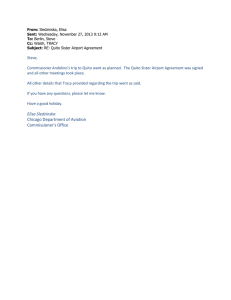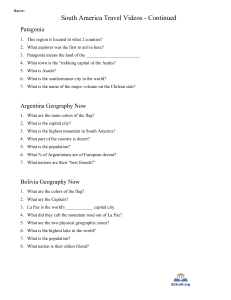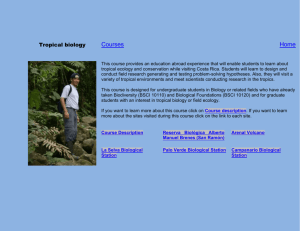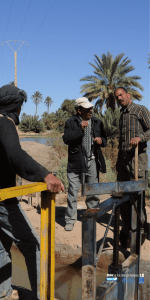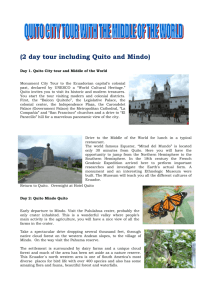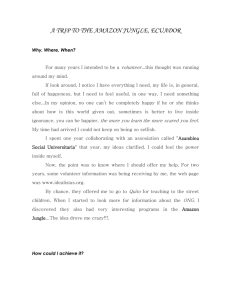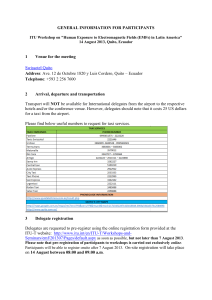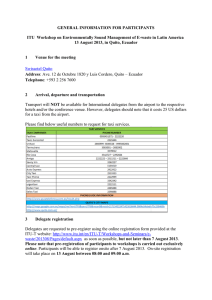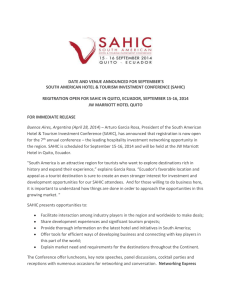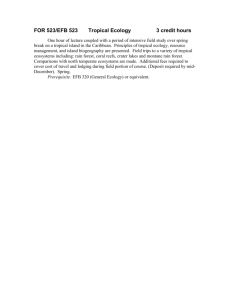Tropical Biodiversity - Ontario Universities Program in Field Biology
advertisement
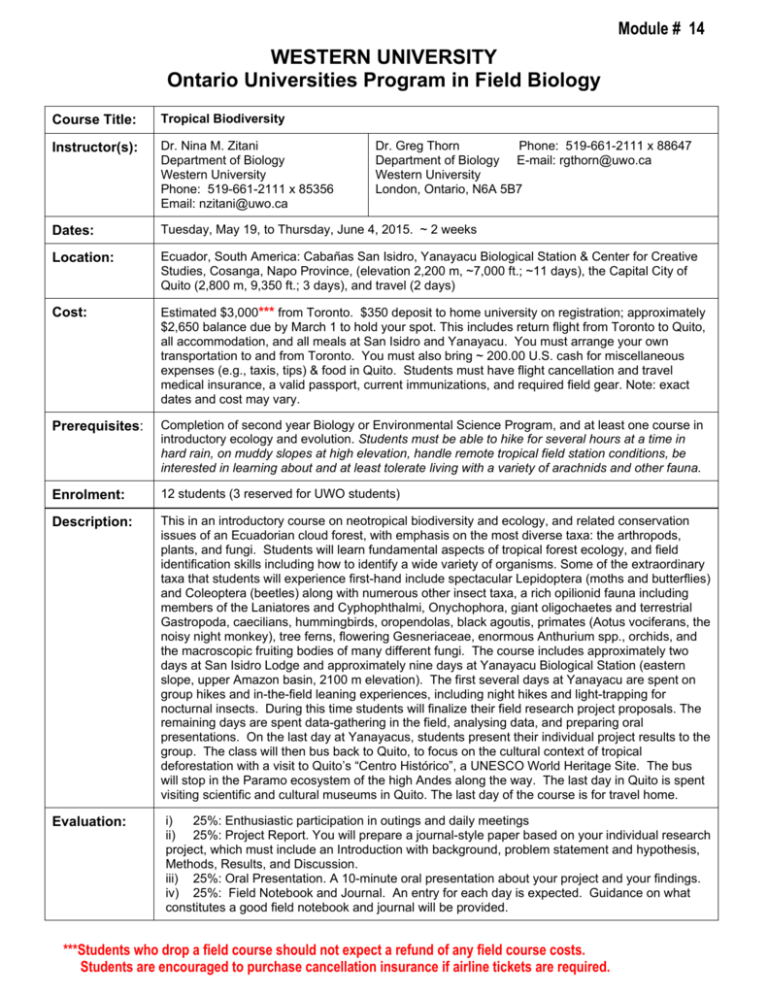
Module # 14 WESTERN UNIVERSITY Ontario Universities Program in Field Biology Course Title: Tropical Biodiversity Instructor(s): Dr. Nina M. Zitani Department of Biology Western University Phone: 519-661-2111 x 85356 Email: nzitani@uwo.ca Dates: Tuesday, May 19, to Thursday, June 4, 2015. ~ 2 weeks Location: Ecuador, South America: Cabañas San Isidro, Yanayacu Biological Station & Center for Creative Studies, Cosanga, Napo Province, (elevation 2,200 m, ~7,000 ft.; ~11 days), the Capital City of Quito (2,800 m, 9,350 ft.; 3 days), and travel (2 days) Cost: Estimated $3,000*** from Toronto. $350 deposit to home university on registration; approximately $2,650 balance due by March 1 to hold your spot. This includes return flight from Toronto to Quito, all accommodation, and all meals at San Isidro and Yanayacu. You must arrange your own transportation to and from Toronto. You must also bring ~ 200.00 U.S. cash for miscellaneous expenses (e.g., taxis, tips) & food in Quito. Students must have flight cancellation and travel medical insurance, a valid passport, current immunizations, and required field gear. Note: exact dates and cost may vary. Prerequisites: Completion of second year Biology or Environmental Science Program, and at least one course in introductory ecology and evolution. Students must be able to hike for several hours at a time in hard rain, on muddy slopes at high elevation, handle remote tropical field station conditions, be interested in learning about and at least tolerate living with a variety of arachnids and other fauna. Enrolment: 12 students (3 reserved for UWO students) Description: This in an introductory course on neotropical biodiversity and ecology, and related conservation issues of an Ecuadorian cloud forest, with emphasis on the most diverse taxa: the arthropods, plants, and fungi. Students will learn fundamental aspects of tropical forest ecology, and field identification skills including how to identify a wide variety of organisms. Some of the extraordinary taxa that students will experience first-hand include spectacular Lepidoptera (moths and butterflies) and Coleoptera (beetles) along with numerous other insect taxa, a rich opilionid fauna including members of the Laniatores and Cyphophthalmi, Onychophora, giant oligochaetes and terrestrial Gastropoda, caecilians, hummingbirds, oropendolas, black agoutis, primates (Aotus vociferans, the noisy night monkey), tree ferns, flowering Gesneriaceae, enormous Anthurium spp., orchids, and the macroscopic fruiting bodies of many different fungi. The course includes approximately two days at San Isidro Lodge and approximately nine days at Yanayacu Biological Station (eastern slope, upper Amazon basin, 2100 m elevation). The first several days at Yanayacu are spent on group hikes and in-the-field leaning experiences, including night hikes and light-trapping for nocturnal insects. During this time students will finalize their field research project proposals. The remaining days are spent data-gathering in the field, analysing data, and preparing oral presentations. On the last day at Yanayacus, students present their individual project results to the group. The class will then bus back to Quito, to focus on the cultural context of tropical deforestation with a visit to Quito’s “Centro Histórico”, a UNESCO World Heritage Site. The bus will stop in the Paramo ecosystem of the high Andes along the way. The last day in Quito is spent visiting scientific and cultural museums in Quito. The last day of the course is for travel home. Evaluation: i) 25%: Enthusiastic participation in outings and daily meetings ii) 25%: Project Report. You will prepare a journal-style paper based on your individual research project, which must include an Introduction with background, problem statement and hypothesis, Methods, Results, and Discussion. iii) 25%: Oral Presentation. A 10-minute oral presentation about your project and your findings. iv) 25%: Field Notebook and Journal. An entry for each day is expected. Guidance on what constitutes a good field notebook and journal will be provided. Dr. Greg Thorn Phone: 519-661-2111 x 88647 Department of Biology E-mail: rgthorn@uwo.ca Western University London, Ontario, N6A 5B7 ***Students who drop a field course should not expect a refund of any field course costs. Students are encouraged to purchase cancellation insurance if airline tickets are required.
